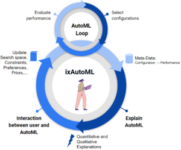The applications and potential of AI in science are enormous. AI not only helps to make existing knowledge more discoverable and more readily available. AI is also invaluable in the search for new materials, chemical compounds and biological agents, for example to use solar energy more efficiently or to develop drugs against emerging pathogens. In the process, scientists are faced with major challenges: They have almost infinite chemical and biological options. Such discoveries require end-to-end AI-powered automation – from experimental design to execution and analysis.
Today’s computational learning systems are not yet capable of realizing the full potential of AI-enabled materials, chemical, environmental, and life sciences. We need new AI methods that can both predict complex phenomena and provide insights into underlying processes. Such methods will be the basis for developing tailored systems capable of addressing major global health and environmental challenges. Research is being conducted at L3S on the necessary AI methods.

Conditional Coding for Learned Image and Video Compression

NFDI4 Data Science

Online Optimierung

Robotics Lab









